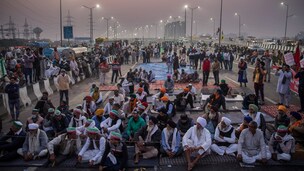India may relax scrutiny of deals for non-Chinese investors from Hong Kong soon: Report
As per the proposals, beneficial owners from nations sharing a land border with India will have to mandatorily seek the Centre's approval to acquire over 10 percent stake in any local firm.
December 21, 2020 / 05:37 PM IST
PM Narendra Modi with FM Nirmala Sitharaman (Image: PTI)
PM Narendra Modi-led Union government is considering proposals to reduce scrutiny of deals by Hong Kong-based investors if Chinese firms are not involved in the transaction.
As per the proposals under consideration, beneficial owners from nations sharing a land border with India will have to mandatorily seek the Centre's approval to acquire over 10 percent stake in any local firm, reported the Business Standard. However, they can only apply as long as Chinese firms aren’t involved in the transactions.
Locals, ITBP personnel push back Chinese soldiers in civilian clothes in eastern Ladakh: Report
Meanwhile, the Union government is also working on formalising investment rules for its neighbours, amid ongoing border standoff with China. Till now more than 140 proposals -- both from China and Hong Kong -- worth more than $1.75 billion have been delayed.
With the new framework under formulation, the government is expecting to speed up the permission regarding issues as firms in India are keenly waiting for clearances for foreign capital to overcome the economic loss due to the COVID-19 pandemic.
Moneycontrol could not verify these details independently.
Recently, India has taken a series of steps against China amid the escalating border tensions. The Union government has banned Chinese apps and tightened visa rules for Chinese nationals. Apart from this, India has also imposed curbs on firms from countries which share a land border with China from bidding for government contracts.
Both ministries of home affairs and external affairs have issued guidelines for security and political clearances respectively for all these investment proposals.










_2020091018165303jzv.jpg)


























